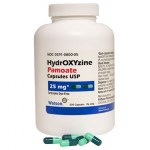Hydroxyzine (Anxanil)
Brand Name - Anxanil, Atarax, Hydroxyzine Paoate, Vistaril Capsules, Suspension
- Type of Drug: Antihistamine.
- Prescribed for: Nausea and vomiting; anxiety, tension, or agitation; itching caused by allergies; and sedation (before or after a general anesthetic). Hydroxyzine injection has been Used to treat acute adult psychiatric emergencies (including acute alcoholism), for surgical sedation, and for sedation before or after delivering a baby.
Hydroxyzine General Information
Hydroxyzine is an antihistamine with muscle-relaxing, antiemetic, bronchial dilation, pain-relieving, and antispasm properties. As such, Hydroxyzine has been used in a variety of applications, including relieving temporary anxiety such as stress of dental or other minor surgical procedures, acute emotional problems, and the management of anxiety associated with stomach and digestive disorders, skin problems, and behavior difficulties in children. It is a relatively older medicine and has been passed by for newer medications by most doctors, but it still works in a wide variety of situations.
Cautions and Warnings
Hydroxyzine should not be used if you are sensitive or allergic to it.
Possible Side Effects
Wheezing, chest tightness, and breathing difficulty are signs of a drug-sensitivity reaction.
- Most common: dry mouth and drowsiness. These usually disappear after a few days of continuous use or when the dose is reduced.
- Infrequent: occasional tremors or convulsions at higher doses.
Hydroxyzine Drug Interactions
• Hydroxyzine has a depressive effect on the nervous system, producing drowsiness and sleepiness. It should not be used with alcohol, sedatives, tranquilizers, antihistamines, or other depressants. When Hydroxyzine is taken together with one of these drugs, the dose of the latter should be cut in half.
Food Interactions
Take this drug with food if it upsets your stomach.
Usual Dose
Adult: 25 to 100 mg 3 to 4 times per day.
Child (age 6 and older): 5 to 25 mg 3 to 4 times per day. Child (under age 6): 5 to 10 mg 3 to 4 times per day.
Hydroxyzine Overdosage
The most common sign of overdose is sleepiness. Overdose victims should be taken to a hospital emergency room for treatment. ALWAYS bring the medicine bottle with you.
Special Information
Be aware of the depressive effect of Hydroxyzine: Be careful when driving, operating hazardous machinery, or doing anything that requires intense concentration.
The dry mouth associated with taking Hydroxyzine can increase your risk of dental cavities and decay. Pay attention to dental hygiene while taking this medicine.
If you develop drug-sensitivity reaction to Hydroxyzine (see Possible Side Effects), call your doctor.
If you forget to take a dose of Hydroxyzine, take it as soon as you remember. If it is almost time for your next dose, skip the one you forgot and continue with your regular schedule. Do not take a double dose.
Hydroxyzine Special Populations
Pregnancy/Breast-feeding
Antihistamines have not been proven to be a cause of birth defects or other problems in pregnant women. Animal studies have shown that regular treatment with Hydroxyzine can cause birth defects during the first months of pregnancy. Do not take any antihistamine without your doctor’s knowledge.
Hydroxyzine can reduce the amount of breast milk you make. Also, small amounts of Hydroxyzine may pass into breast milk and can sedate a nursing infant. Nursing mothers taking Hydroxyzine should bottle-feed their babies.
Seniors
Older adults are more sensitive to antihistamine side effects, particularly confusion, difficult or painful urination, drowsiness, dizziness, a faint feeling, nightmares or excitement, nervousness, restlessness, irritability, and dry mouth, nose, or throat.

